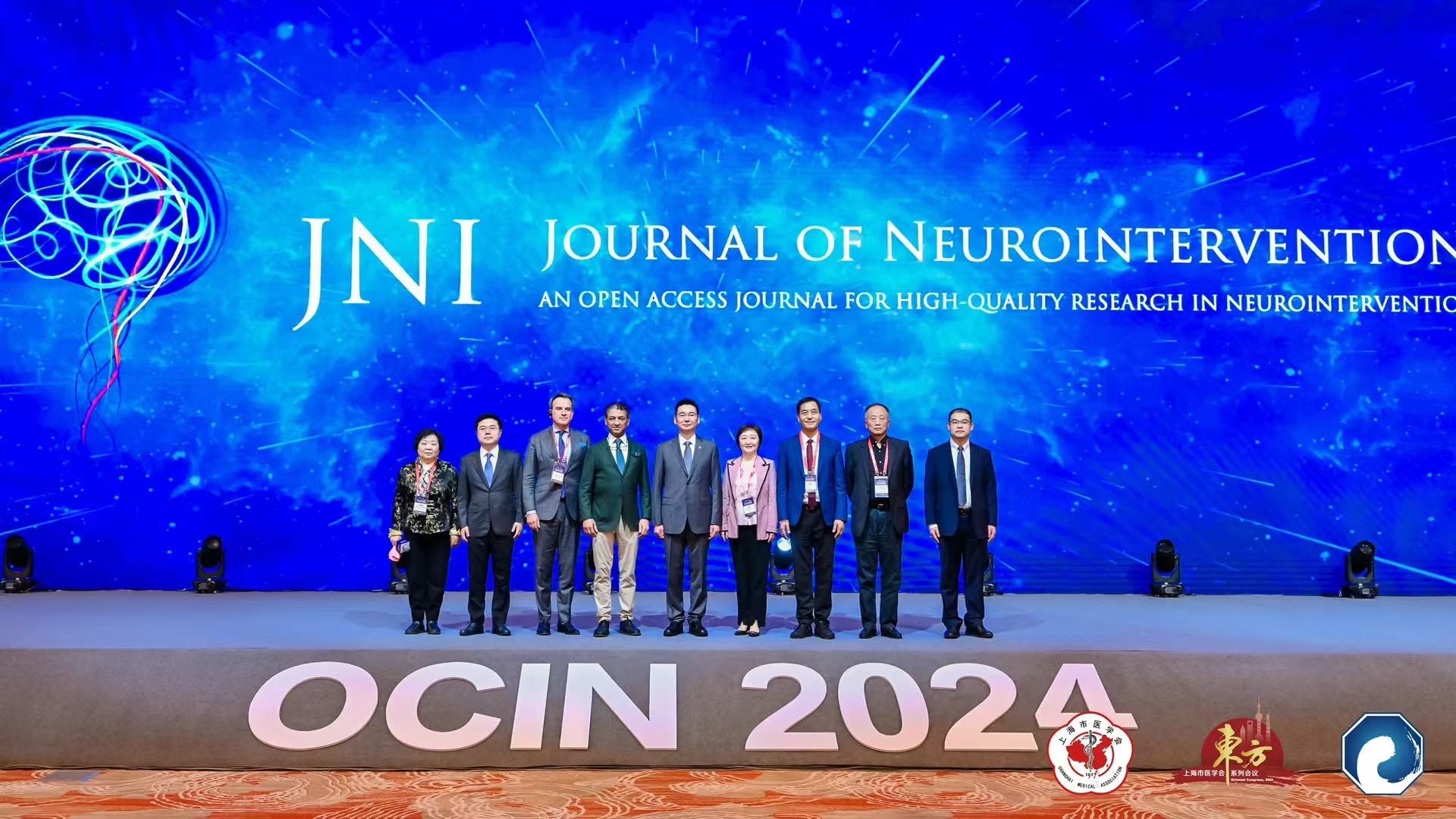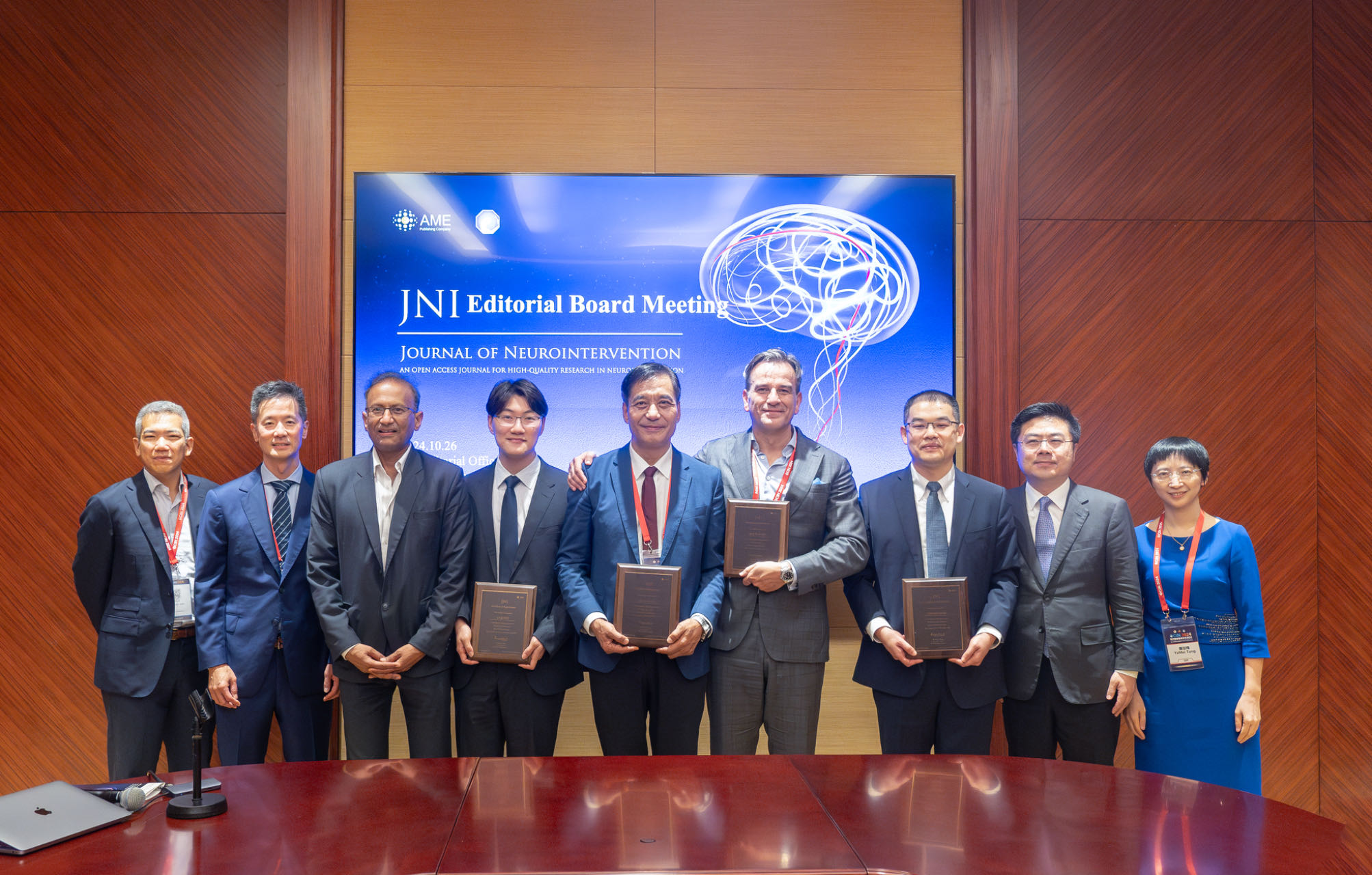Adnan Siddiqui1, Crystal M. Yan2
1Department of Neurosurgery, Jacobs School of Medicine and Biomedical Sciences, University at Buffalo, Buffalo, NY, USA; 2JNI Editorial Office, AME Publishing Company
Correspondence to: Crystal M. Yan. JNI Editorial Office, AME Publishing Company. Email: jni@amegroups.com
Editor’s note
From 24th to 27th, 2024, the 24th Oriental Conference of Interventional Neurovascology (OCIN 2024) was successfully held in Shanghai, China. This conference is designed for neurosurgeons, interventional neuroradiologists, neurologists, endovascular surgeons, residents, nurse practitioners, physician assistants and interventional technicians, and other health care professionals with a special interest in the field of management of neurovascular diseases and will be directly applicable to their daily practices.
As the official journal of OCIN, Journal of Neurointervention (JNI) held a launch ceremony (Figure 1) at the opening ceremony of the conference and held the first editorial board meeting (Figure 2) on the afternoon of the 26th.

Figure 1 The launch ceremony of Journal of Neurointervention

Figure 2 JNI’s editorial board meeting
Also, we were glad to have this chance to conduct an interview with Prof. Adnan Siddiqui, our Editor-in-Chief, Distinguished Professor and Vice Chairman in the Department of Neurosurgery (UBNS) at the State University of New York at Buffalo’s Jacobs School of Medicine and Biomedical Sciences.
Expert’s introduction
Prof. Siddiqui has special interest and expertise in the performance of complementary microsurgical, radiosurgical and endovascular techniques for the comprehensive management of cerebrovascular conditions. This spectrum of disease includes aneurysms and arteriovenous malformations, as well as dural, cavernous and spinal fistulae. He has special interests in endovascular management of acute ischemic stroke, as well as endovascular and microsurgical management of extracranial and intracranial vascular occlusive disease. Other clinical interests include endovascular management of intractable epistaxis, facial vascular malformations, head, neck, and brain tumor embolization and microsurgical resection of skull base tumors.
He serves as the Chief Executive Officer and Chief Medical Officer at the Jacobs Institute (JI) which is focused on entrepreneurship, development and education opportunities with partners in the medical technology industry including strategics, startups and individual inventors to advance the care of patients with vascular diseases. His goal is to improve the current offerings and translate technologies being developed at the Institute’s idea to reality (i2R) into therapeutic and commercial successes.
He leads the Canon Stroke and Vascular Research Center (CSVRC) at University at Buffalo. This multi-disciplinary center with multiple concurrent major NIH grants, houses neurosurgeons, neuroscientists, physicists and biomedical engineers working collaboratively on cutting edge research focused on neurovascular biology and pathology including stroke and aneurysms, imaging, simulation and hemodynamics. In addition, he serves as the Director of the Neurosurgical Stroke Service at the Gates Vascular Institute in Buffalo, one of the busiest Comprehensive Stroke Services in New York State and the United States.
Interview (Video 1)
JNI: At this OCIN 2024, which topic are you most anticipating?
Prof. Siddiqui: I’m most excited and emotional to talk about my ability to speak about Dr. L. Nelson (Nick) Hopkins. I’m deeply moved by the way Prof. Jianmin Liu and the OCIN Organization honored him, with a special symposium and large posters. I saw the beautiful image outside the building as well with his picture. It means a lot to me, and I'm honestly most moved by that in Shanghai this year.
JNI: You have designed, conducted and led multiple major national and international clinical trials and currently serves as National and International PI for multiple major funded multi-site trials. What elements do you believe are necessary for a clinical trial to be successful?
Prof. Siddiqui: In my experience, for a clinical trial to be successful, it has to be very well designed and have a few really important elements. Firstly, it has to be designed by people who actually do the work. So, I don't think I have the credentials to organize a pharmaceutical trial, even though I might use a drug that's not my primary focus. If you're designing an interventional trial, it needs to be designed by interventionists. The second is that you have to really carefully consider the workflow for the trial. The workflow for the trial, especially a successful trial, is as close to the normal natural workflow. Because the more abnormal, the more complicated, the harder to enroll. So, the workflow is very important. The third thing is to get your baseline statistical analysis done well so that you fully understand what you're trying to achieve. Because if your study is underpowered, it will not move up in the world. If your study is not well designed, does not have the right stopping rules, does not have the right elements of statistical analysis, it will fail. I think that's very important. The next thing is the topic has to be really interesting which people really truly argue about (oh! we should do this or we should do that). Where there's a lot of enthusiasm about trying to address that question, so you've got to find a topic that appeals to people. The final thing I would say is having a successful group of sites that are very good at rapid enrollment and high-quality enrollment. I think those are elements to a successful clinical trial and I'm sure there are many others that I'm missing.
JNI: What motivated you to pursue a career in Neurosurgery?
Prof. Siddiqui: My journey into neurosurgery began after a car accident in the Himalayas with my family when I was a teenager. My younger brother who is 11 years old died from a spinal cord injury. My sister was severely injured with closed head injury and was comatose for many months. That was my first exposure to neurosurgery and I realized that it was extremely primitive and we did not have a good understanding of the brain at all. So, that became my primary motivation when I got into medical school to pursue neuroscience. But then neurosurgery took over neurology as the right clinical discipline for me because as a neurosurgeon I had the ability to intervene initially through open procedures and then eventually through endovascular procedures. I love the access that we have as neurosurgeons to the brain to be able to study processes that can make patients and their families lives better.
JNI: What would be your suggestions for the young doctors who are pouring their lives into this filed?
Prof. Siddiqui: My advice to those who have an interest in neuroscience, particularly neurointervention, is to do something with their hands. If you don't like using your hands, you should not go into neurointervention. But if you like doing things with your hands and you like neuroscience, I think the field of neurointervention is about to explode. Because right now all you're seeing everybody talk about is treating stroke, treating carotid disease, treating aneurysms. But the field is going to start exploding into brain computer interface, hydrocephalus, venous disease, neural oncology, functional disease, psychiatric disease. I think these are all things that I suspect I'm going to start seeing in my lifetime become reality.
JNI: As the Editor-in-Chief, what are your expectations for our new journal JNI?
Prof. Siddiqui: I think the field of neuro-intervention is on the verge of explosion and there are some very good journals out there. JNIS is my favorite journal for neurointervention right now. There are also some other neurosurgery journals which are much older and cater to neurointervention as well. INR also does a fantastic job with the European and North American. But what I find missing? Is the ability to see what's happening in the eastern hemisphere of the world? I know China is really leading a lot of clinical trials, for example, MAGIC-MT, PROTECT-MT,ICAS-MT are unbelievable excellent high rigor, high quality trials. So, it behooves us to have a journal which is centered on this in the eastern hemisphere that publish and publicize these results and disseminate these achievements broadly. But I do believe that I would like American authors to submit to the JNI as well, and that's what my role will be as an Editor-in-Chief.